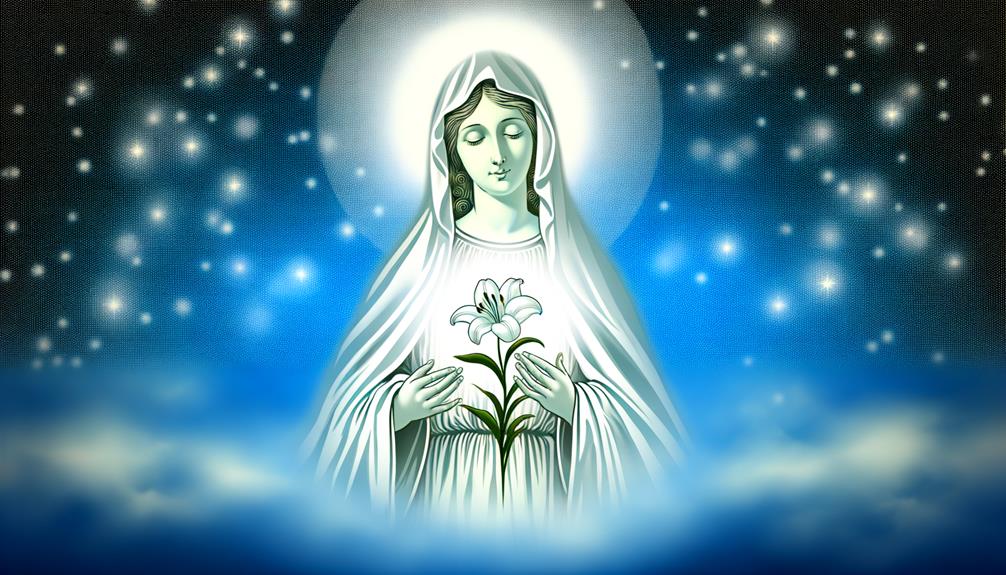Mary Grace Meaning in Bible: Grace and Devotion
The term ‘Mary Grace‘ marries two deeply significant Christian concepts: the virtues of Mary, the mother of Jesus, and the theological notion of grace. Mary epitomizes humility, obedience, and unwavering faith, as illustrated in her acceptance of divine will (Luke 1:38) and her hymn of praise, the Magnificat (Luke 1:46-55).
Grace, understood as unmerited favor from God, underscores salvation as a divine gift (Ephesians 2:8-9). Combined, ‘Mary Grace’ encapsulates a unique spiritual ideal of divine favor embodied through exemplary human virtues.
To explore this intersection of purity, faith, and divine benevolence, consider the broader theological contexts and devotional practices enveloped within these terms.

Mary Grace Meaning in the Bible: Understanding the Spiritual Significance
| Aspect | Meaning |
|---|---|
| Name ‘Mary’ | Derived from the Hebrew name “Miriam,” meaning “beloved,” “bitter,” or “wished-for child.” In the Bible, Mary is the mother of Jesus, symbolizing purity and devotion to God. |
| Name ‘Grace’ | Refers to the unmerited favor and love of God, as described in Christian theology, symbolizing divine grace given to humanity. |
| Combined Meaning | Mary Grace combines the attributes of purity and devotion (Mary) with the gift of divine favor and kindness (Grace). |
| Spiritual Significance | The name signifies a person who is loved by God and blessed with His grace, embodying qualities of compassion and spiritual strength. |
| Biblical Context | Mary’s role in the Bible is central to the story of Jesus’ birth, while grace is a fundamental concept in Christian salvation, emphasizing God’s love and mercy. |
| Symbolism | Symbolizes a connection to the divine, representing qualities of forgiveness, humility, and spiritual favor. |
| Key Bible Verses | Luke 1:28 (The angel’s greeting to Mary, “full of grace”); Ephesians 2:8 (Grace as a gift of God). |
Biblical Significance of Mary

In the biblical context, Mary holds significant importance as the mother of Jesus Christ, embodying virtues of obedience, humility, and faith.
Her acceptance of the divine will is exemplified in Luke 1:38, where she responds to the angel Gabriel with, ‘Behold, I am the servant of the Lord; let it be to me according to your word.’ This moment not only highlights her unwavering faith but also her role as a willing participant in God’s salvific plan.
Additionally, Mary’s humility is evident in the Magnificat (Luke 1:46-55), a song of praise that underscores her recognition of God’s greatness.
Her obedience and faith set a theological foundation, illustrating an ideal model of discipleship and divine favor within the Christian tradition.
Mary as a Symbol of Purity

Mary’s status as a symbol of purity is underscored by the doctrine of the Virgin Birth, which signifies her unique role in the divine plan.
This purity extends beyond physical virginity, positioning her as a spiritual role model for believers, exemplifying unwavering faith and obedience to God’s will.
Within this framework, her life and actions offer profound insights into the theological and moral dimensions of purity in Christian doctrine.
Virgin Birth Significance
The virgin birth, central to Christian theology, underscores Mary’s role as a symbol of purity, reflecting her unique status and divine selection.
This miraculous event, described in the Gospels of Matthew and Luke, signifies the intervention of the Holy Spirit, affirming the sanctity of Jesus’ origins.
Mary’s virginity is not merely a physical state but symbolizes moral integrity and spiritual purity. It challenges the natural order, emphasizing the divine nature of Christ’s conception.
This theological cornerstone sets Mary apart as the immaculate vessel chosen to bear the Son of God.
The virgin birth consequently encapsulates the convergence of divine grace and human obedience, reinforcing Mary’s exemplary purity and pivotal role within the Christian narrative.
Spiritual Role Model
As a spiritual role model, Mary epitomizes the ideal of purity within Christian theology, serving as an enduring symbol of divine grace and moral integrity.
Her virginity, underscored by the doctrine of the Immaculate Conception, elevates her as a paragon of spiritual and physical purity, unmarred by original sin.
This theological construct not only accentuates her unique role in salvation history but also sets a high moral benchmark for believers.
Mary’s purity is intricately linked with her unwavering faith and obedience to God’s will, as exemplified in her acceptance of the Annunciation.
Consequently, she embodies the virtues of humility, piety, and unwavering devotion, offering a profound model for spiritual emulation and aspiration within the Christian tradition.
The Role of Mary in Jesus’ Life

In examining the role of Mary in Jesus’ life, it is essential to contemplate her contributions through maternal guidance and care, which provided a foundation for His early development and well-being.
Additionally, Mary’s spiritual influence is evident in various scriptural accounts, which highlight her unwavering faith and its impact on Jesus’ ministry.
These dimensions underscore the profound, multifaceted role she played in shaping the life and mission of Jesus.
Maternal Guidance and Care
Demonstrating unwavering faith and devotion, Mary played a pivotal role in nurturing and guiding Jesus throughout His early life and ministry.
Her maternal guidance is evident in various biblical narratives, such as the nativity accounts in the Gospels of Matthew and Luke.
Mary’s presence at important events, including the wedding at Cana (John 2:1-11), underscores her active involvement in Jesus’ life.
Her profound understanding of His divine mission is reflected in her thoughtful responses, such as the Magnificat (Luke 1:46-55).
Additionally, Mary’s nurturing role extended beyond physical care, encompassing moral and spiritual instruction that shaped Jesus’ human experiences.
This maternal care, rooted in faith and obedience, greatly contributed to the development of Jesus’ early character and ministry.
Spiritual Influence on Jesus
Mary’s spiritual influence on Jesus is intricately interwoven with her unwavering faith and deep understanding of His divine mission. Her role is not merely maternal but profoundly spiritual, shaping Jesus’ early comprehension of His purpose.
Scriptural accounts, such as Mary’s proclamation in the Magnificat (Luke 1:46-55), reveal her profound theological insight and trust in God’s plan. At the Wedding at Cana (John 2:1-11), Mary’s subtle yet decisive intervention signifies her awareness of Jesus’ divine potential, catalyzing His first public miracle.
Her presence at the crucifixion (John 19:25-27) underscores her enduring faith amid suffering, offering Jesus both emotional and spiritual solace. Consequently, Mary’s spiritual influence is a cornerstone in understanding Jesus’ life and ministry within a theological context.
Grace in Biblical Context

Exploring the concept of grace within the biblical context reveals its foundational role in the relationship between humanity and the divine. Grace, as depicted in the Bible, signifies unmerited favor bestowed by God upon humanity, emphasizing His benevolence and mercy. The Greek term ‘charis’ encapsulates this notion, frequently appearing in the New Covenant to underscore God’s benevolent actions towards mankind. The biblical understanding of grace extends beyond mere favoritism to convey God’s undeserved kindness and forgiveness towards His creation. It is through grace that God offers salvation and reconciliation to humanity, emphasizing the redemptive power of His love. The biblical understanding of grace therefore emphasizes the divine initiative in extending love and mercy to a sinful and undeserving humanity. This profound meaning of grace in the Bible is intricately linked to the idea of redemption, whereby humanity, despite its flaws and transgressions, is invited into a restored relationship with God. The transformative power of grace inspires believers to extend this same grace to others, fostering a cycle of love and forgiveness that mirrors God’s actions. Ultimately, the meaning of grace in the Bible serves as a reminder that human efforts alone cannot attain divine favor; rather, it is through accepting and embodying this grace that one truly experiences spiritual renewal and unity with the divine.
| Biblical Reference | Description of Grace |
|---|---|
| Ephesians 2:8-9 | Salvation through faith, not by works |
| Romans 3:24 | Justification freely by His grace |
| 2 Corinthians 12:9 | Strength made perfect in weakness by grace |
| Titus 2:11 | Grace bringing salvation to all men |
| James 4:6 | God giving more grace to the humble |
This theological construct illustrates grace as integral to divine-human interaction.
Divine Favor and Grace

Divine favor, often synonymous with grace in biblical literature, represents God’s deliberate and unsolicited bestowal of blessings upon individuals.
This concept is pivotal in understanding the nature of God’s interactions with humanity, characterized by acts of mercy and kindness independent of human merit.
Scriptural references, such as in Ephesians 2:8-9, underscore that grace is a gift, not contingent on works but on divine benevolence.
The theological implications suggest that divine favor is an expression of God’s unconditional love and sovereign will.
Analyzing these aspects within their historical and cultural contexts provides deeper insight into the transformative power attributed to divine favor, illustrating how it shapes the spiritual journey and moral framework of believers.
Mary Grace: A Combined Virtue

The term ‘Mary Grace’ encapsulates a combined virtue that intertwines the biblical connotations of grace with the exemplary life of Mary, the mother of Jesus, presenting a rich tapestry of theological and moral significance. This duality is significant for several reasons:
- Divine Favor: Grace in the biblical sense often signifies God’s unmerited favor, which Mary uniquely embodies as the chosen mother of Christ.
- Virtuous Living: Mary’s life represents obedience, faith, and humility, virtues that resonate deeply within Christian teachings.
- Intercessory Role: Mary’s grace extends to her role as an intercessor, a point of spiritual connection for believers.
- Symbol of Purity: Mary stands as a symbol of purity and devotion, aligning seamlessly with the concept of divine grace.
This synthesis enriches our understanding of both grace and Mary’s role in Christian theology.
Humility in the Name Mary

How does the name Mary, deeply rooted in biblical tradition, encapsulate the virtue of humility within its historical and theological context?
The name Mary, derived from the Hebrew Miriam, is emblematic of profound humility, particularly through the figure of Mary, the mother of Jesus.
In the Gospel of Luke, her response to the Annunciation—’Behold, I am the servant of the Lord; let it be to me according to your word’ (Luke 1:38)—exemplifies submission and selflessness.
Historically, Mary’s humble origins and her acceptance of divine will reflect a counter-cultural stance against societal norms of power and prestige.
Theologically, her humility is seen as a vessel for divine grace, setting a paradigmatic example for Christian discipleship and servitude.
Spiritual Implications of Grace

Grace, a cornerstone of Christian theology, carries profound spiritual implications that permeate the believer’s relationship with God and their understanding of salvation.
Its multifaceted nature can be analyzed through several key aspects:
- Unmerited Favor: Grace is often described as God’s unearned kindness, emphasizing that salvation is a gift rather than a reward.
- Redemption: Through grace, believers are redeemed from sin, highlighting God’s mercy and forgiveness.
- Transformation: Grace fosters spiritual growth and transformation, enabling believers to live in accordance with divine will.
- Sustenance: It provides ongoing support and strength, essential for persevering through life’s challenges.
These dimensions underscore the pivotal role of grace in shaping a Christian’s spiritual journey.
The Enduring Appeal of Mary Grace

Mary Grace’s enduring appeal in biblical scholarship lies in its profound encapsulation of divine favor and spiritual regeneration, serving as a beacon of theological reflection and personal devotion.
This dual-natured concept harmonizes the humility and obedience embodied by Mary with the transformative power of grace. Scholars often explore Mary Grace as a paradigm, reflecting the intersection of human receptivity and divine intervention.
It highlights how grace, mediated through Mary, transcends mere theological abstraction, becoming an intimate, lived experience. The enduring resonance of Mary Grace continues to inspire believers, offering a lens through which to understand the divine-human relationship.
This appeal is magnified in devotional practices, underscoring its significance across ecclesiastical and individual spiritual landscapes.
Conclusion
The name ‘Mary Grace’ intertwines profound biblical virtues, symbolizing purity, divine favor, and humility.
In the biblical context, Mary epitomizes purity and maternal devotion, while grace signifies unmerited divine favor.
Together, these elements create a tapestry of spiritual depth, illustrating the harmonious blend of human humility and divine benevolence.
Consequently, ‘Mary Grace’ becomes a beacon of enduring spiritual significance, reflecting the timeless appeal of these combined virtues within Christian tradition.






